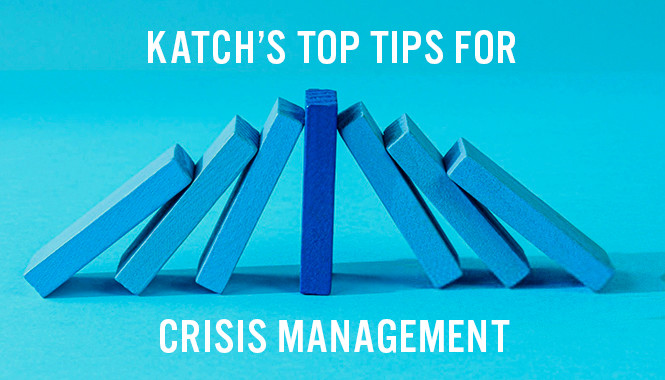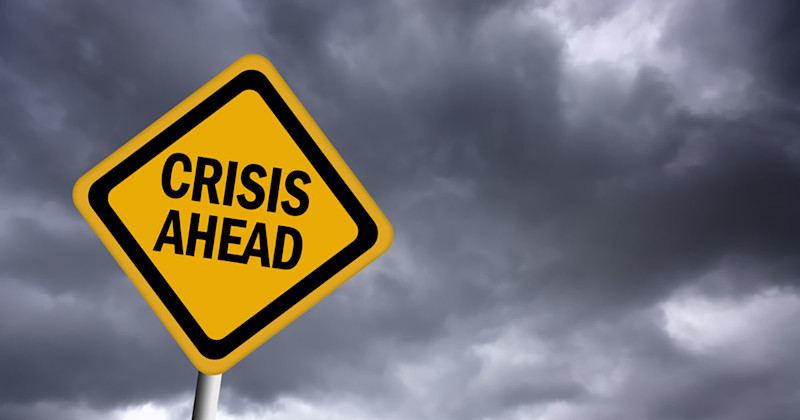
Building a strong crisis communications strategy is so important for both budding and established brands to navigate any potentially detrimental situation
Every day people deal with different types of crises. They are unavoidable and a part and parcel of life. Whether it’s abject weather, illness, accidents, or anything in between, they are just one of those annoying little facets of life. In the PR and events world, it is important to handle a crisis in the right way, so things don’t go from bad to worse. At Katch International, we believe in the overwhelming benefit of having a solid crisis communications strategy and always taking the right steps to deal with them before it’s too late.

Crisis communication is the strategic approach of managing communication between an organisation and its stakeholders during a disruptive event. A crisis can be any situation that threatens the reputation, operations, or financial stability of an organisation, artist, brand, or venue. Utilising effective crisis communication can help to minimise damage, maintain trust, and emerge from the crisis stronger than before.
Below are some key principles and best practices for effective crisis communications for anyone involved in the PR and communication's world:
Have a plan in place
The first step in effective crisis communication is to have a plan in place before a crisis occurs. This plan should outline the key roles and responsibilities of the crisis management team, the procedures for communicating with stakeholders, and the key messages that should be communicated. The plan should be regularly reviewed and updated to ensure that it remains relevant and effective.
2. Act quickly and decisively
During a crisis, time is of the essence. It is important to act quickly and decisively to contain the crisis and minimise its impact. This may involve making difficult decisions, such as temporarily halting operations or postponing a planned event. It is important to communicate these decisions clearly and promptly to everyone affected, ensuring that they are on the same page and that the same message is being communicated across the board.
3. Proactive Vs. Reactive
Being proactive rather than reactive when it comes to crisis communications in PR can make a significant difference in managing a crisis effectively. A proactive approach involves identifying potential issues before they arise and having a plan in place to address them, while a reactive approach involves responding to a crisis as it happens. Depending on the situation, different response tactics may be necessary, such as issuing a public apology, providing updates and information, or engaging with the people involved to address their concerns.
The escalation of the matter can also dictate the appropriate response, whether it's a simple issue that can be resolved quickly or a more complex and serious issue that requires a more comprehensive response. Brands that overlook the importance of being proactive in crisis communications may find themselves struggling to manage the fallout of a crisis, damaging their reputation, which leads to people losing trust in the brand.
4. Be transparent and honest
Transparency and honesty are key principles of effective crisis communication. It is important to be as transparent as possible about the situation and the steps being taken to address it. If mistakes were made, it is important to acknowledge them and take responsibility. Attempting to conceal or minimise the severity of a crisis can damage an organisation's reputation and erode trust. If people find out after that the message being portrayed wasn’t honest it can severely damage their trust in the brand leading to an even bigger crisis than it initially appeared.
5. Tailor messages to specific audiences
Different people will have different concerns and information needs during a crisis. It is important to tailor messages to specific audiences, such as customers, employees, investors, and the media. This can help to ensure that everyone receives the information that is most relevant to them and it helps to prevent any potential confusion or misinformation. If a certain group of people does not need to know certain information, then there is no need to share it with them, which will also help to prevent any unnecessary confusion or worry.
6. Monitor and respond to feedback
During a crisis, it is important to monitor feedback from every party that may be affected, whether it be the client or their customers, and respond to any questions or concerns promptly. Social media can be a particularly powerful tool for monitoring and responding to feedback. By engaging with everyone involved in a transparent and empathetic manner, organisations can help to maintain trust and build goodwill.
For everyone in the PR, social media, and global comms sphere, crisis communication is a critical component and absolutely essential for effective crisis management. By having a plan in place, acting quickly and decisively, being proactive, transparent and honest, tailoring messages to specific audiences, and monitoring and responding to feedback, organisations and brands can navigate a crisis with minimal damage to their reputation and emerge stronger than before.

With some of the biggest clients in the UAE and globally including Atlantis The Royal, Live Nation, BRAG, Rixos The Palm Dubai Hotel & Suites and Rixos Premium Dubai, Rove Hotels, W Abu Dhabi - Yas Island, several hotels under the Address Hotels + Resorts brand, and many others as part of Katch International's impressive portfolio, it is so important that we have a strong plan in place to deal with any crisis, no matter how small, that may occur. Speak to us today to see how we can assist in any of your PR, social media, branding, digital disruption, or global comms needs, you never know what next crisis might be around the corner.
Katch our game-changing PR and Communications, Social Media, Branding and Design, Brand Consultancy, Digital Marketing, and Global Communications services to help your brand make noise. Get in touch with our 360-Marketing agency in Dubai, Qatar, and London, and let’s get the conversation started!
